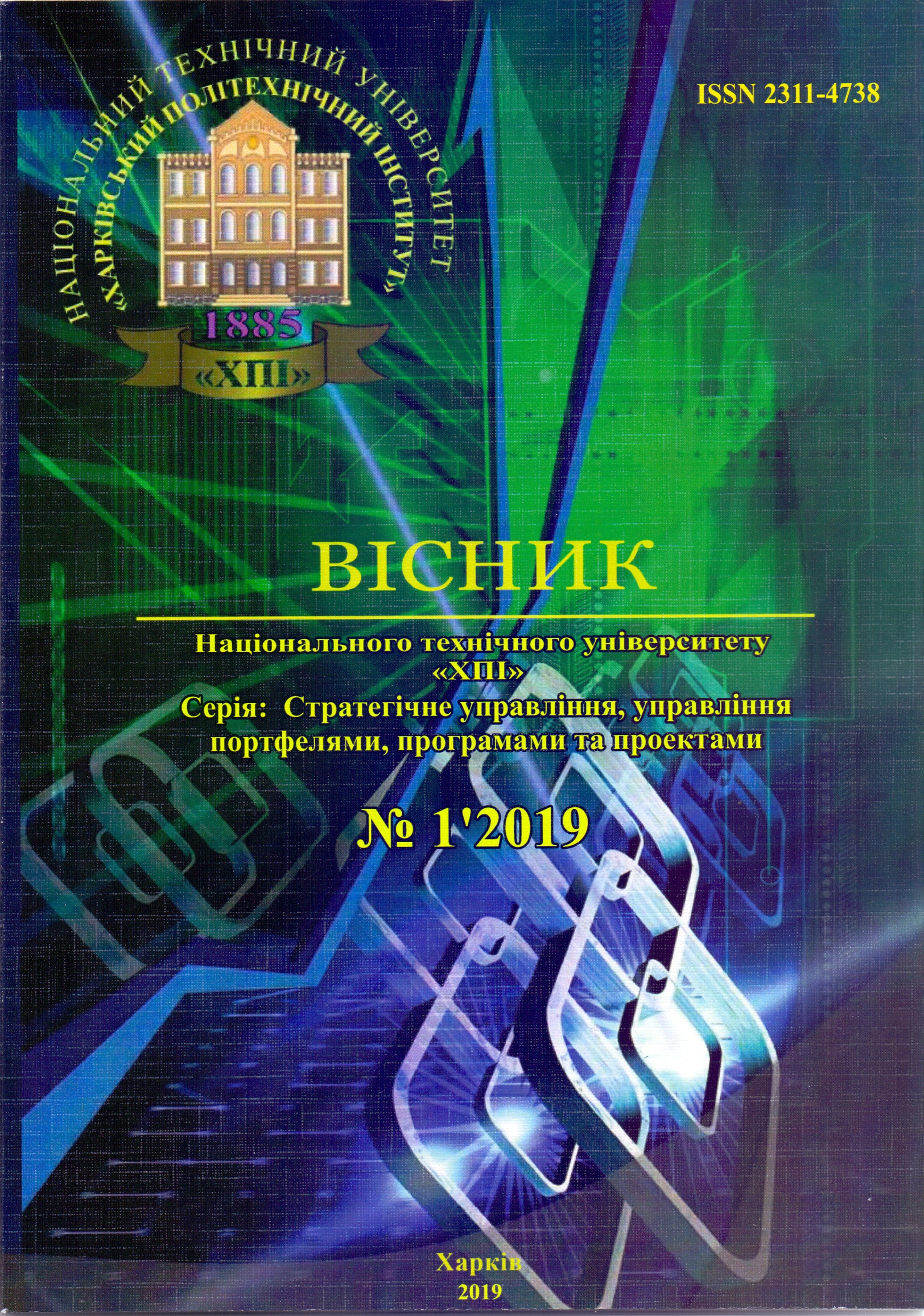«ON-LINE SUPPORT» SYSTEMS AS A COMPONENT OF STRATEGY OF REFORMATION OF HIGHER EDUCATION
DOI:
https://doi.org/10.20998/2413-3000.2019.1326.11Keywords:
CRM system, main stakeholder, absenteeism, education reform strategy, innovative technologies, leadAbstract
The work is devoted to the study of the impact of the use of automated bots of consultants in making managerial decisions on improving the efficiency of management in higher education institutions in the conditions of reform.
The current conditions for the reform of higher education in Ukraine are analyzed and directions of integration in the world educational process are determined. Higher education reform is to consume the constitutional rights of citizens to high-quality higher education and equal access to high-quality higher education, reorganization of the system of higher education management in order to protect the national, regional and local interests, as well as the interests of all subjects of the national system of higher education of Ukraine. It is established that the development of application of automated control systems in educational institutions abroad is becoming. One of the varieties of this is the CRM-system. It is recommended to apply the above-mentioned approach in higher education institutions in Ukraine. It is proposed to use the work of the CRM-system in higher education institutions of Ukraine, which involves the introduction of automated systems of "on-line support" for the adoption of administrative decisions by the administration on the basis of the attraction and processing of information that covers the issues of financial and economic, legal and social activities of the educational institution and promotes increase its competitiveness in conditions of integration reform. The essence of the notion of the main stakeholder of a higher educational institution is defined. The introduction of a flexible automated system of material incentives in higher education institutions is recommended. It is determined that the use of innovative technologies in the work of the CRM system should ensure transparency, increase the level of employee satisfaction and prevent absenteeism.
References
Stratehiyi reformuvannya vyshchoyi osvity v Ukrayini do 2020 roku» (Proekt). Available at: http://osvita.ua/doc/files/news/438/43883/HE_Reforms_Strategy_11_11_2014.pdf
Bakun T. V. Ispol'zovaniye marketingovykh tekhnologiy v sfere vysshego obrazovaniya [Using marketing technology in higher education]. Aktual'nyye voprosy ekonomiki i upravleniya: materialy II Mezhdunar. nauch. konf. (g. Moskva, oktyabr' 2013 g. )[ Current issues of economics and management: Proceedings of the II International. scientific conf. (Moscow, October 2013)]. M.: Buki-Vedi, 2013. pp. 97-99. Available at: https://moluch.ru/conf/econ/archive/91/4298/
Voronchak, I. Socialjna vidpovidaljnistj biznesu jak socialjno– ekonomichnyj fenomen [Social responsibility of business as a social and economic phenomenon]. Vidpovidaljna ekonomika [Responsible economy]. 2009, no. 1, pp. 90–103.
Balakyreva O. V., Levyn R. B Stejkholdery obrazovanija - sub#ekty i roli [Education stakeholders - actors and roles]. Novyy kolehium: naukovyy informatsiynyy zhurnal : problemy vyshchoyi osvity. Khark. nats. un-t radioelektroniky [New College: Scientific Information Magazine: Problems of Higher Education. Hark nats un-t of radio electronics]; Khark. nats. ped. un-t im. H.S. Skovorody. Kharkiv, 2017, no. 1 (87). pp. 18-21.
Kushch S.P., Afanas'yev A. A. Marketingovyye podkhody kompanii na raznykh urovnyakh upravleniya mezhfirmennoy set'yu [Marketing approaches of the company at different levels of management of the intercompany network]. Available at: http://www.ecsocman.edu.ru/db/msg/150506/
Tret'yak O. A. Marketing: novyye oriyentiry modeli upravleniya: Uchebnik [Marketing: new directions in management model: Textbook]. M.: INFRA-M, 2009. XII, 403 p.
Peyn E. Rukovodstvo po CRM. Put' k sovershenstvovaniyu menedzhmenta kliyentov [CRM Guide. The path to improving customer management]. SPb.: Izd-vo: «Grevtsov Pablisher», Available at: http://www.management.com.ua/marketing/mark165.html/
Bakun T. V., Leynveber O. YU. Integrirovannyye marketingovyye kommunikatsii vuza v ramkakh kontseptsii marketinga vzaimootnosheniy [Integrated marketing communications of the university within the framework of the relationship marketing concept]. Vestnik Omskogo universiteta. Seriya «Ekonomika» [Bulletin of Omsk University. Economy series]. 2012, no. 4, pp.143–146.
Mamontov S. A., Bakun T. V. Informatsionnoye (kommunikatsionnoye) obespecheniye marketinga vzaimootnosheniy vuza [Information (communication) provision of marketing relations of the university]. Vestnik Omskogo universiteta. Seriya «Ekonomika» [Bulletin of Omsk University. Economy series]. 2011, no. 2, pp.123–127.
Gutsa Oleg, Ukrainets Aleksey, Andreychikov Aleksandr. Interaktivnyye reglamenty: on-line konsalting novogo pokoleniya [Interactive regulations: on-line consulting of a new generation]. Business Excellence. 2015, no. 10, oktyabr', pp. 84-86.
Kazantsev D. I. Podkhod k proyektirovaniyu CRM sistemy dlya kafedry v VUZe [Approach to the CRM system design for the department in the university]. Molodoy uchenyy [Young scientist]. 2010, no9, pp. 58-60. Available at: https://moluch.ru/archive/20/2030/
Solov'yev T. G., Kochetova O. A. Otsenka effektivnosti sistemy upravleniya vzaimootnosheniyami vuza s potrebitelyami obrazovatel'nykh uslug [Evaluation of the effectiveness of the system of management of relations of the university with consumers of educational services]. Izvestiya vysshikh uchebnykh zavedeniy [University news]. Povolzhskiy region. Obshchestvennyye nauki. 2012, no. 4 (24). pp. 119-129.
Ball, S. J. Big policies/small world: An introduction to international perspectives in education policy. Comparative education. 1998, no. 34(2), pp. 119.
Rumbley, L. E. Intelligent Internationalization: A 21st Century Imperative. International Higher Education. 2015. (80), pp. 16–17.
Andrushshenko V. P., Savel’yev V. L. Osvitnya polityka (ohlyad poryadku dennoho) [ducational policy (agenda overview)]. K. : MP Lesya, 2010. 368 p.
Downloads
Published
Issue
Section
License
Copyright (c) 2019 Наталія Володимирівна Ігуменцева, Юрій Вікторович Овсюченко, Олена Василівна Пересада, Інна Борисівна Прібильнова

This work is licensed under a Creative Commons Attribution-NonCommercial-ShareAlike 4.0 International License.
Our journal abides by the Creative Commons copyright rights and permissions for open access journals.
Authors who publish with this journal agree to the following terms:
Authors hold the copyright without restrictions and grant the journal right of first publication with the work simultaneously licensed under a Creative Commons Attribution-NonCommercial-ShareAlike 4.0 International License (CC BY-NC-SA 4.0) that allows others to share the work with an acknowledgement of the work's authorship and initial publication in this journal.
Authors are able to enter into separate, additional contractual arrangements for the non-commercial and non-exclusive distribution of the journal's published version of the work (e.g., post it to an institutional repository or publish it in a book), with an acknowledgement of its initial publication in this journal.
Authors are permitted and encouraged to post their published work online (e.g., in institutional repositories or on their website) as it can lead to productive exchanges, as well as earlier and greater citation of published work.

